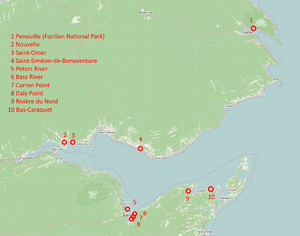Maritime ringlet facts for kids
Quick facts for kids Maritime ringlet |
|
|---|---|
 |
|
| Scientific classification |
The maritime ringlet (scientific name: Coenonympha nipisiquit) is a special and rare type of butterfly. It belongs to the Nymphalidae family, which includes many beautiful butterflies. This butterfly is considered "at risk" in Canada. This means it needs help to survive because its home (habitat) is small and it's affected by things like water pollution. You can find it only in a specific area of Canada, around the Chaleur Bay. This bay is located between New Brunswick and the Gaspé Peninsula.
Contents
Discovery and Home
This unique butterfly was first found in 1939. It was discovered near Bathurst, New Brunswick by a scientist named J. McDunnough.
The maritime ringlet lives in special places called salt marshes. These are coastal wetlands that are often flooded by ocean tides. In New Brunswick, there are only six known salt marshes where this butterfly lives. Four of these important spots are very close to each other. They are all within 10 kilometers of Bathurst Harbour.
What it Eats
The young maritime ringlets, called larvae (or caterpillars), have a very specific diet. They only eat a plant called salt-meadow cordgrass (Spartina patens).
Adult butterflies drink nectar from flowers. Their favorite nectar plant is sea lavender (Limonium nashii). Nectar gives them energy to fly and find mates.
Who Eats the Maritime Ringlet
Like many animals, the maritime ringlet is part of the food chain. It can be eaten by other creatures. Birds often hunt these butterflies. Larger insects also prey on them.
Helping the Butterfly Survive
Because the maritime ringlet is rare, people are working to protect it. Dr. Reginald Webster, an entomologist (a scientist who studies insects), has played a big role. Starting in 1993, he led a project funded by the WWF.
This project helped create a plan to save the butterfly. It also set up ways to check on the butterfly's numbers. Thanks to these efforts, a new group of maritime ringlets was successfully introduced to the Acadian Peninsula. This helps the species spread to new safe areas.
Similar Butterflies
The maritime ringlet looks a bit like another butterfly. This similar species is called the common ringlet (Coenonympha tullia). While they look alike, the maritime ringlet is much rarer and lives in specific coastal areas.

